Track Listing
1. Call of the Champions
The Mormon Tabernacle Choir - Craig Jessop, Director
Utah Symphony (5:00)
The Official Theme of the 2002 Olympic
Winter Games
__________________________________________________
American
Journey
(a.ka. "The Unfinished Journey", "Celebration
2000")
Recording Arts Orchestra of Los Angeles (24:41)
2. I. Immigration and Building (5:39)
3. II. The Country at War (3:22)
4. III. Popular Entertainment (2:30)
5. IV. Arts and Sports (2:37)
6. V. Civil Rights and the Women's Movement
(3:27)
7. VI. Flight and Technology (7:10)
American Journey, a six-movement work,
was composed for the Millennium celebrations in Washington, D.C. as part of a multimedia
presentation done in collaboration with Steven Spielberg, Poets Laureate Rita Dove, Robert
Pinsky, and Maya Angelou. The presentation also featured the words of Carl Sandburg,
Abraham Lincoln and Martin Luther King, Jr. Rather than a chronological rendering of the
"American" century, this is, rather, an attempt to portray the 20th Century
thematically, "with a series of tableaux that could be dealt with individually,"
says Williams.
__________________________________________________
8. Song for World Peace
(Reworked Version of "Satellite Celebration", 1996)
Recording Arts Orchestra of Los Angeles (4:42)
Song for World Peace, as tender and
lyrical as anything Williams has ever written, was composed for the Boston Symphony
Orchestra and dedicated to its longtime Music Director, Seiji Ozawa. The piece was first
performed in Tokyo during a recent tour of the Pacific Rim.
__________________________________________________
9. Jubilee 350 (1980)
Recording Arts Orchestra of Los Angeles (3:44)
__________________________________________________
10. The Mission Theme
(Theme for NBC News) (1985)
Recording Arts Orchestra of Los Angeles (3:30)
__________________________________________________
11. For New York
(Variations on Themes by Leonard Bernstein)
(a.k.a. "To Lenny! To Lenny!") (1988)
Recording Arts Orchestra of Los Angeles (3:03)
For New York: Variations on Themes by
Leonard Bernstein originated as part of a tribute for the composer's 70th birthday.
Williams combined "New York, New York" from On the Town and "America"
from West Side Story with "a little snippet of 'Happy Birthday' in there, of
course...It was meant to be fun" and it is "but it now turns out to be a
kind of elegy both for Lenny and a warm tip of the hat to New York City itself."
__________________________________________________
12. Sound the Bells!
(1993)
Recording Arts Orchestra of Los Angeles (2:50)
Sound the Bells, written to celebrate a
marriage in the Japanese Royal Family, finds Williams pursuing the inspiration of the
great Japanese temple bells. Instead of resorting to a false orientalism, the composer
exploits the timbre and luster of the western symphony orchestra's own bells to convey
American greetings to the Japanese Royal Couple.
__________________________________________________
13. Hymn to New England
(1987)
Utah Symphony (3:11)
__________________________________________________
14. Celebrate Discovery
(1990)
Recording Arts Orchestra of Los Angeles (3:49)
__________________________________________________
BONUS TRACK:
15. Summon the Heroes
(1996)
The Boston Pops Orchestra (6:16)
Written for the Centennial Celebration
of the Modern Olympic Games,
Atlanta, Georgia, July 19, 1996
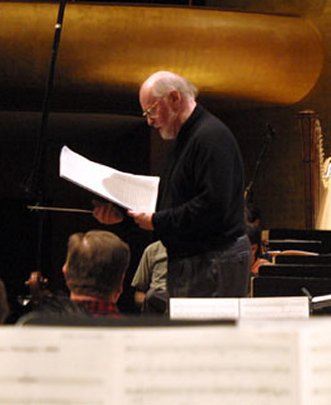
Album Credits
Producer
John Williams, Ken Wannberg
Engineer
Simon Rhodes, Shawn Murphy
Guest Artists
Mormon Tabernacle Choir
Track 1 & 13:
Recorded at Maurice Abravanel Hall, Salt Lake City, Utah
November 27, 2001
Track 2 - 12, 14:
Recorded at Sony Pictures Studios, Culver City, California
December 9-10, 1999 and June 19-20, 2000
Track 15:
Recorded at Symphony Hall, Boston, Massachusetts
January 1996
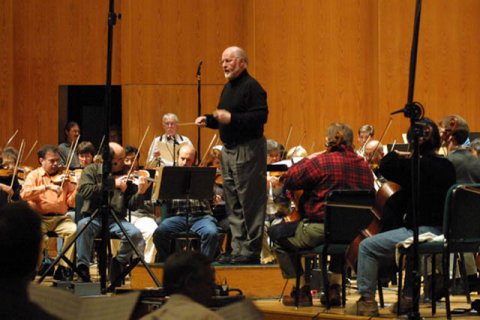
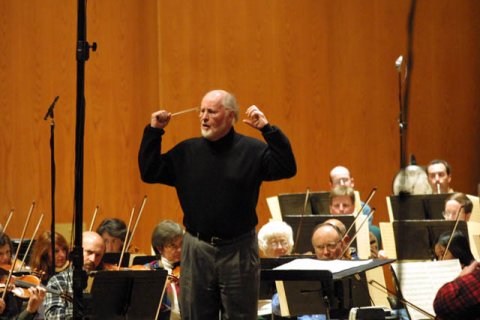
Liner Notes
by Jackson Braider, WGBH Radio
You can't hear John Williams in full stride and not feel proud to be alive. Williams was
the natural choice to write "Call of the Champions," the official theme of the
2002 Olympic Winter Games in Salt Lake City. Having previously composed themes for the
Games in Los Angeles, Seoul and Atlanta, Williams has proven himself singularly masterful
at conveying the Olympic ideal in music. ("Summon the Heroes" from the 1996
Games is included in this collection as a bonus track).
Williams has gradually become America's unofficial Composer Laureate, the first composer
since John Phillip Sousa to kindle a sense of grandeur in the American psyche. In the
soaring Olympic theme "Call of the Champions," Williams infuses his work with a
kind of impassioned dignity that makes the heart swell with radiance.
With Salt Lake City as the setting for the 2002 Olympic Winter Games, the world-famous
Mormon Tabernacle Choir 350 voices strong and an American cultural icon was the
clear choice to be featured in the work. What words should this tremendous choir sing?
Nothing immediately leapt to mind. "That was okay," Williams said. "We
would use the choir to enhance the orchestra. The incomparable sound, the noise that a
choir and orchestra can make is so magnificent."
And yet Williams could not let it alone. "In thinking and reading about what we might
have sung, I came across this Baron de Coubertin motto: 'Citius, Altius, Fortius'
[swifter, higher, stronger]." (Coubertin was the founder of the modern Olympic Games
back in the early 1890s.) "I thought it would make a wonderful declamatory handle,
just that triad of words sung in a very forceful way by the chorus. We had all 350 members
of the Mormon Tabernacle Choir singing this and it was electrifying. It sounds like all
the heroes coming down from Olympus and chanting together."
"Always this triad of words, but at the end of the piece I needed to break the rhythm
of the text. So I took the liberty of adding the word clarius to the motto a word a
Roman might have used to speak of intelligence and clarity of mind."
The result is classic Williams: A celebration of humanity in musical form, with the
orchestra and choir cranked up as rock fans would have it to "ten" and
listeners of every stripe feeling at once ennobled and inspired to embrace the community
of humankind.
Shortly after the "Call of the Champions" recording session, John Williams and I
talked about this collection. In the course of that interview, one thing became
immediately apparent about Williams: his profound sense of purpose as a composer. That
might sound somewhat odd, but when Williams speaks of trying to write
"uplifting" compositions, for example, that's exactly how he wants people to
feel when they hear his work.
American Journey, a six-movement work, was composed for the Millennium celebrations in
Washington, D.C. as part of a multimedia presentation done in collaboration with Steven
Spielberg, Poets Laureate Rita Dove, Robert Pinsky, and Maya Angelou. The presentation
also featured the words of Carl Sandburg, Abraham Lincoln and Martin Luther King, Jr.
Rather than a chronological rendering of the "American" century, this is,
rather, an attempt to portray the 20th Century thematically, "with a series of
tableaux that could be dealt with individually," says Williams. Beneath the newsy
titles "Immigration and Building," "The Country at War,"
"Popular Entertainment," "Arts and Sports," "Civil Rights and the
Women's Movement," "Flight and Technology" there were extraordinary
human stories that fueled Williams's imagination.
"There is so much for Americans to be proud of, even in some of our misfires and our
outright failures. For example, in the fifth movement, 'Civil Rights and the Women's
Movement', you see the dogs and the water hoses and you also hear, combined with the
music, the ennobling words of Dr. King. It gives us a sense that we have come through some
hellish fire together."
"That was our take," Williams continues. "We wanted to look at the good
things and the bad things and frame them in such a way as to take heed, and to take heart
at the same time, and have this be an uplifting experience."
American Journey is presented here for the first time as a complete concert work.
It takes John Williams to remind us that "grandeur" is not always measured in
time. What these shorter works capture is the composer's extraordinary sense of occasion.
Jubilee 350, Celebrate Discovery, and Hymn to New England were composed during Williams'
years as Music Director of the Boston Pops Orchestra. Sound the Bells, written to
celebrate a marriage in the Japanese Royal Family, finds Williams pursuing the inspiration
of the great Japanese temple bells. Instead of resorting to a false orientalism, the
composer exploits the timbre and luster of the western symphony orchestra's own bells to
convey American greetings to the Japanese Royal Couple. Song for World Peace, as tender
and lyrical as anything Williams has ever written, was composed for the Boston Symphony
Orchestra and dedicated to its longtime Music Director, Seiji Ozawa. The piece was first
performed in Tokyo during a recent tour of the Pacific Rim.
For New York: Variations on Themes by Leonard Bernstein originated as part of a tribute
for the composer's 70th birthday. Williams combined "New York, New York" from On
the Town and "America" from West Side Story with "a little snippet of
'Happy Birthday' in there, of course...It was meant to be fun" and it is
"but it now turns out to be a kind of elegy both for Lenny and a warm tip of the hat
to New York City itself."
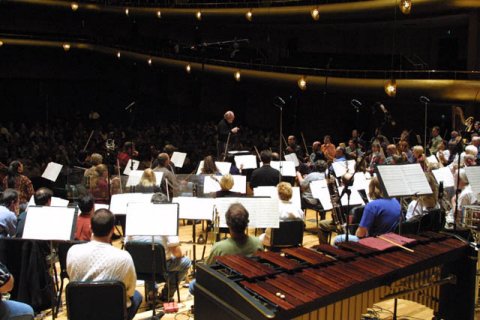
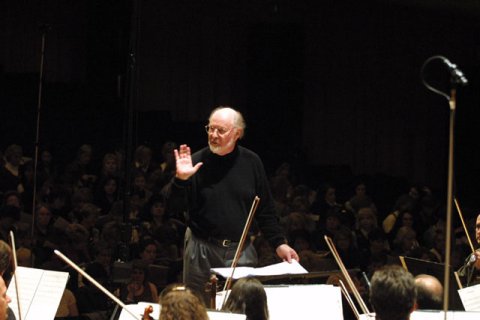
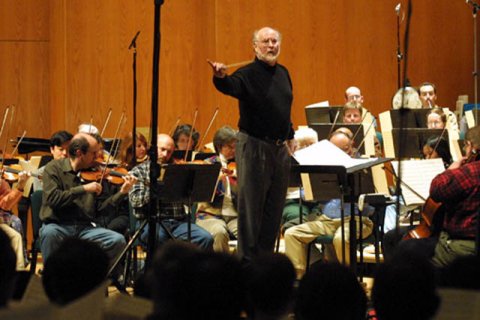
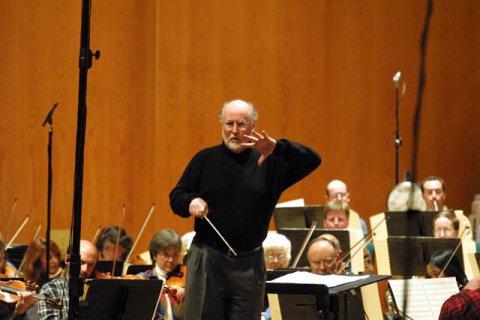
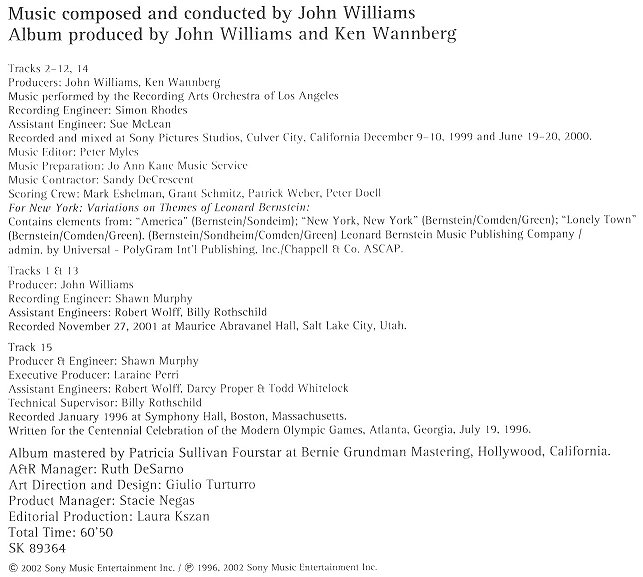
|








